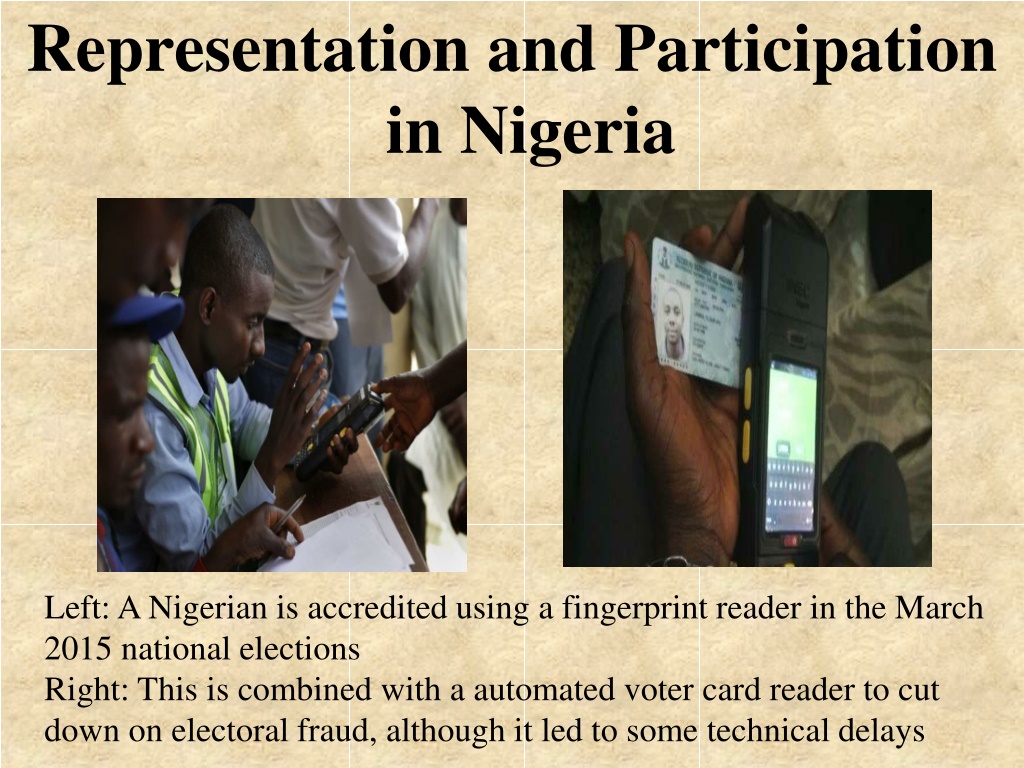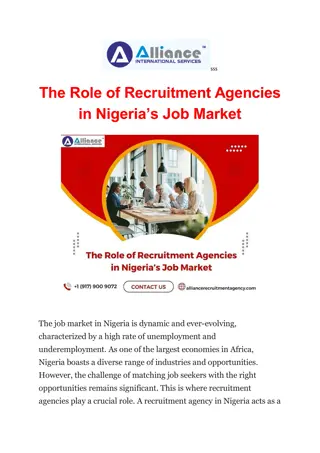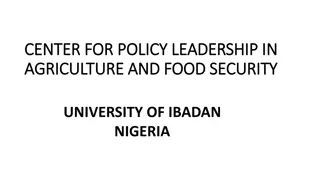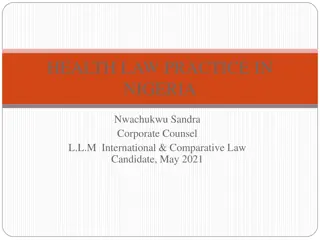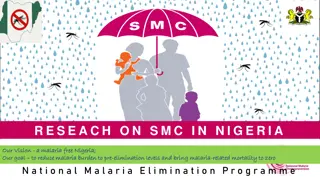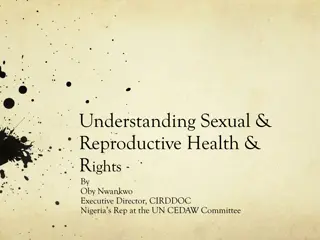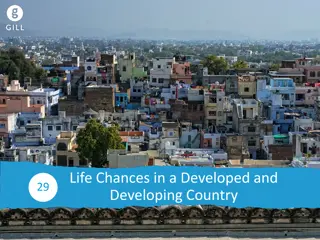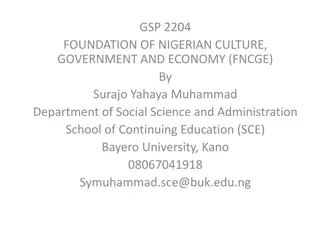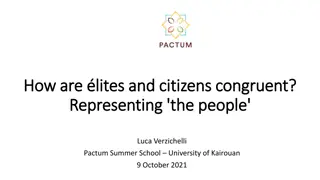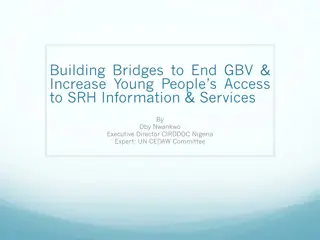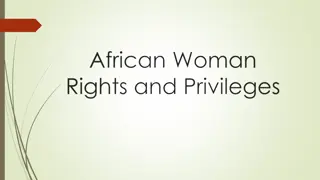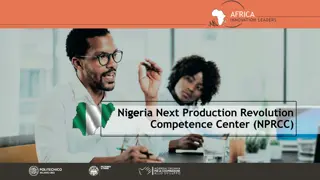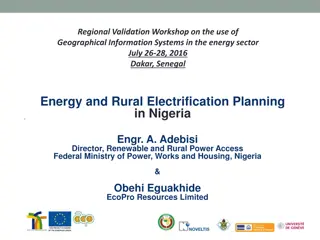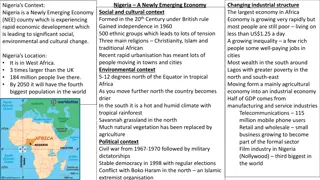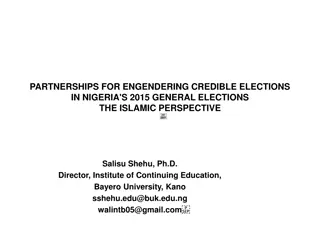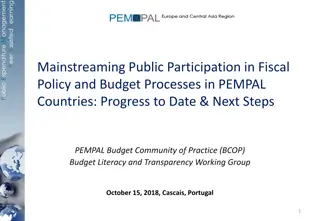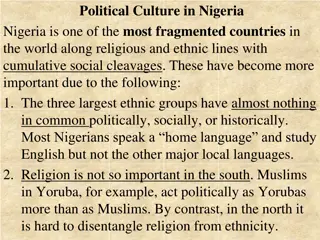Representation and Participation in Nigeria
Nigerian elections include the use of fingerprint and voter card readers to combat fraud, despite some technical challenges. The political landscape is marked by regional and ethnic party affiliations, with the People's Democratic Party (PDP) historically dominant. Other parties like the All Nigeria Peoples Party (ANPP) and Action Congress of Nigeria (ACN) have also played significant roles. The formation of the All Progressives Congress (APC) in 2013 as a formidable opposition to the PDP reshaped the political dynamics in Nigeria.
Download Presentation

Please find below an Image/Link to download the presentation.
The content on the website is provided AS IS for your information and personal use only. It may not be sold, licensed, or shared on other websites without obtaining consent from the author.If you encounter any issues during the download, it is possible that the publisher has removed the file from their server.
You are allowed to download the files provided on this website for personal or commercial use, subject to the condition that they are used lawfully. All files are the property of their respective owners.
The content on the website is provided AS IS for your information and personal use only. It may not be sold, licensed, or shared on other websites without obtaining consent from the author.
E N D
Presentation Transcript
Representation and Participation in Nigeria Left: A Nigerian is accredited using a fingerprint reader in the March 2015 national elections Right: This is combined with a automated voter card reader to cut down on electoral fraud, although it led to some technical delays
Parties and Elections Predictably political parties in Nigeria have almost always been regionally and ethnically based. Unlike Mexico and China, Nigeria did not develop a one-party system in the 20th century that contributed to political stability. Instead, Nigeria s extreme factionalism led to the development of so many parties that it was almost impossible to create a coherent party system. Nigeria s multi-party system reinforced and deepened ethnic and religious cleavages. Parties have often been personalistic in nature and so tended to fade with leadership changes.
Leading Nigerian Parties The People s Democratic Party (PDP): This the party of power that dominated Nigerian politics since 1998 up to its loss in 2015 with a majority of wins in presidential, National Assembly and gubernatorial elections. The PDP is the party of Olusegun Obasanjo. In 2003 he received about 62% of the vote for president. In 2007, amidst widespread fraud, Umaru Yar Adua received about 70% of the vote. In 2011 the PDP presidential candidate, Goodluck Jonathan received 59% of the vote in elections that were judged to be fairer than in the past.
All Nigeria Peoples Party (ANPP): Associated with former General Muhammed Buhari, former military ruler between 1983-85. Buhari is a Muslim from the north, who was ANPPs candidate in 2003 and 2007. Congress for Progressive Change: In March 2010, Buhari left the ANPP for the Congress of Progressive Change, (CPC) which he founded "as a solution to .conflicts in my former party . He lost the 2011election with only 32% of the vote. Action Congress of Nigeria (ACN): A liberal party that had run run former Vice President, Atiku Abubakar (who defected from the PDP) as their presidential candidate in 2007 taking 7% of the vote.
ACN next ran Nuhu Ribadu, a former anti-corruption official, in the 2011 election. He took only 5.4% of the vote. All Progressives Congress(APC) Formed in 2013 and led by Muhammadu Buhari, APC is an alliance of Nigeria's three biggest opposition parties the Action Congress of Nigeria (ACN), the Congress for Progressive Change (CPC), and the All Nigeria Peoples Party(ANPP) formed to take on the Peoples Democratic Party (PDP) in the 2015 election.
Elections Nigerian citizens vote for candidates on three levels: local, state, and national. On the national level they vote for the president, representatives to the House of Representatives, and for senators from their respective states. Elections are first past the post in single member districts which tends to concentrate ethnic support. To escape ethnic based parties of the First and Second Republic the INEC requires that parties earn at least 5% of the votes in 24 of 36 states in local elections in order to advance to state and federal levels. This has tended to greatly reduce the number of parties.
To further limit the influence of the large ethnic groups, the successful Presidential candidate must win at least 25% of the vote in 2/3s of the states. If no candidate in the presidential election does not achieve an absolute majority, then a run off election is to be held within one week, a circumstance that has not yet occurred. (Question: The existence of a presidential runoff election, if no candidate achieves an absolute majority of the vote, is a condition of presidential elections in what other country that we have studied? Has that country had such runoff elections in the past?)
Election Monitoring Elections are monitored by the Independent National Election Commission (INEC) set up in 1998. Previously a Federal Electoral Commission (FEC) had monitored elections since 1960 but was dissolved by a military coup and replaced ultimately by the INEC which faced controversy over its disqualification of Atiku Abubakar (Supreme Court deeming INEC disqualification of candidates as illegal). was rejuvenated by the appointment of the reform minded Professor Muhammadu Jega in 2010 who is credited with supervising cleaner elections in 2011.
Recent Elections Many observers believe that Nigeria has made progress in simply being able to sustain five scheduled popular elections in a row. Yet at least three of these elections were marred by violence and corruption: 2003 Election: Several politicians were assassinated including one of the leaders of Buhari s ANPP. The INEC made an attempt to cleanse the electoral process by declaring almost 6 million voter names as fraudulent. But ballot boxes were often vandalized, stolen, or stuffed with fraudulent votes. Electoral fraud was particularly notable in the south.
2007 Election: These were even worse than the 2003 elections, with both national legislative and presidential races deeply flawed: -President Obasanjo initially sponsored a plan to modify the 1999 Constitution that would allow him to run for a third term in office, but the National Assembly failed to ratify it. The PDP then chose a northerner, Umaru Yar Adua as their candidate who previously was governor of Katsina state. -As noted previously the INEC disqualified the leading competitor, Abubakar from running. While the INEC overturned this, it resulted in many ballots lacking Abubakar s name with only party symbols.
-On election day, international observers, including some from the EU and U.S., witnessed instances of ballot box theft, long delays in the delivery of ballots and a shortage of ballots. Often there was no privacy for voters to mark their ballots in secret. Observers witnessed unused ballots being marked and stuffed into ballot boxes. -Frustrated voters erupted in protest, and the ensuing violence ended in the deaths of over 200 people. -Following the election, opposition candidates brought law suits, but a Court of Appeal ruled that ballot-box stuffing and phantom voting booths were not enough to overturn the outcome.
2011 election: The PDP emerged triumphant in elections for the President, National Assembly, and most state governors. To win at the first round of the presidential election, a candidate not only needs the majority of votes cast, but at least 25% of the vote in two-thirds of Nigeria's 36 states. Goodluck Jonathan, of the PDP, reached that threshold in 31 states; runner-up Muhammad Buhari only did so in 16 states. Most foreign observers hailed the election as the most credible since military rule ended in Nigeria in 1999. However violence in the north broke out after the elections with over 500 killed in riots.
Goodluck Jonathan Muhammad Buhari Nuhu Ribadu The aftermath of violence following the 2011 elections
2015 election: Voters elected the President and members to the House of Representatives and Senate. Of the 15 presidential candidates, the two major ones were the incumbent President Goodluck Jonathan (PDP) and Muhammadu Buhari (APC). Elections were postponed six weeks to March 28, mainly due to the poor distribution of Permanent Voter Cards, and to curb the threats from the Boko Haram insurgency in the northeast. The election was extended one day to March 29 to accommodate crowds of voters, the voter accreditation process and problems with the biometric card readers. This was the most expensive election in Africa to date.
Opposition candidate Muhammadu Buhari won the presidential election by more than 2.5 million votes or 53.96% of the vote. Incumbent President Goodluck Jonathan, who won 44.96% conceded defeat on 31 March, barely after the results had been announced. This action by Jonathan no doubt contributed to the relatively calm aftermath with no major violent incidents reported. The 2015 election marks the first time an incumbent president has lost re-election in Nigeria. It is a remarkable achievement given the past record of deeply flawed elections marred by post-election violence. INEC s efforts contributed much to this.
Presidential election winner by state: Buhari (blue) Jonathan (red). Note that Buhari took both northern and southern states.
The election of the House of Representatives also led to a victory by APC candidates. Of the 360 seats contested APC won 225 seats to PDP s125 seats with 10 for other parties. There were 109 Senate seats up for contention in this election with 60 won by APC and 49 by PDP. Former UN Secretary-General Ban Ki-Moon congratulated the citizens and the government for conducting a peaceful and orderly election. Other international electoral monitoring INGO s noted that elections had been conducted in a "peaceful atmosphere" and met the "criteria of being free and transparent" despite "logistical challenges."[52]
Why did Muhammadu Buhari and the APC win so decisively? The 3/31/15 New York Times described the victory and coming from anger swelling over corruption, inequality and a devastating Islamist insurgency in the nation s north .Nigerians by a wide margin chose an austere former general who once ruled with an iron hand to be their next president. . The election was the most competitive presidential race ever in Nigeria, one of the largest democracies in the world. Now, if power is handed over peacefully, it will be a major shift for the nation the first transfer between civilians of different parties in a country that has spent much of its post- colonial history shaken by military coups.
Inauguration of President Buhari on May 29, 2015
